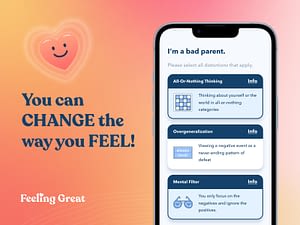Episode 438 The TEAM Approach
to Habits and Addictions
Powerful New, Radically Different
Approaches that Can Help!
Today, Dr. Jill Levitt joins David and Rhonda to discuss and illustrate the TEAM CBT approach to habits and addictions and give a little promo for their upcoming online workshop on Habits and Addictions on March 28, 2025.
You can sign up for the workshop here: cbt-workshop.com
Although the workshop is for mental health professionals, participants will have the chance to work on their own habits and addictions during the workshop in order to gain a more in-depth understanding of the new treatment methods for:
-
Overeating / binging / restricting
-
Drugs
-
Alcohol
-
Procrastination
-
Doomscrolling
-
Excessive cell phone use
-
Internet addiction
-
Excessive use of social media
-
Shop-a-Holic
-
Biting fingernails
-
Video games
-
Gambling
-
And more
David emphasized that nearly all current treatment methods frequently fall short because they focus on control of symptoms using behavior modification rather than the cause. He describes a research study at the Stanford inpatient unit that indicated that 50 common DSM Diagnoses (such as mood disorders, anxiety disorders, personality disorders, and more) were not significantly correlated with any of the DSM addictive / misuse disorders including drugs, alcohol, eating disorders, and gambling, which was not really consistent with the beliefs of many that emotional factors play a central causal role in addictions. In fact, the only significant correlation he noted was between depression and overeating, but the correlation was in the negative direction—in other words, higher levels of depression were associated with weight loss, not weight gain. And, in addition, the magnitude of the correlation was extremely small, indicating that other factors play a far more important role.
So, what is the explanation for this puzzling and anti-intuitive finding? David described a 5-item survey he developed which asks about temptations in use or give in to your habit / addiction in the past week. This tool, in contrast to all of the DSM diagnoses, was very strongly correlated with all the addictions. This suggests that we give in to our habits and addictions for one simple reason–they make us feel great!
At least in the short term!
150 years ago, they didn’t have an epidemic of obesity in America. Why not? Life was likely just as stressful as it is now, maybe even more so!
But what they didn’t have was all the fast food restaurants and all the gooey, tasty foods that are abundantly available today, and they didn’t have the resources to purchase them, either.
This doesn’t mean that behavioral models or diets or other tools have no value. But the TEAM CBT model focuses first on assessing the patient’s motivation for and resistance to treatment using a variety of powerful and innovative new techniques, including:
-
The Triple Paradox
-
The Ten Positive Distortions
-
The Habits and Addictions Log (HAL)
-
The Devil’s Advocate Technique
-
The Five-Minute Rule
-
The “I Stubbornly Refused” Technique
-
The Anti-Procrastination Sheet
-
Relapse Prevention Techniques utilizing
-
The Externalization of Voices
-
The Acceptance Paradox
-
Stimulus Control
-
-
And more



